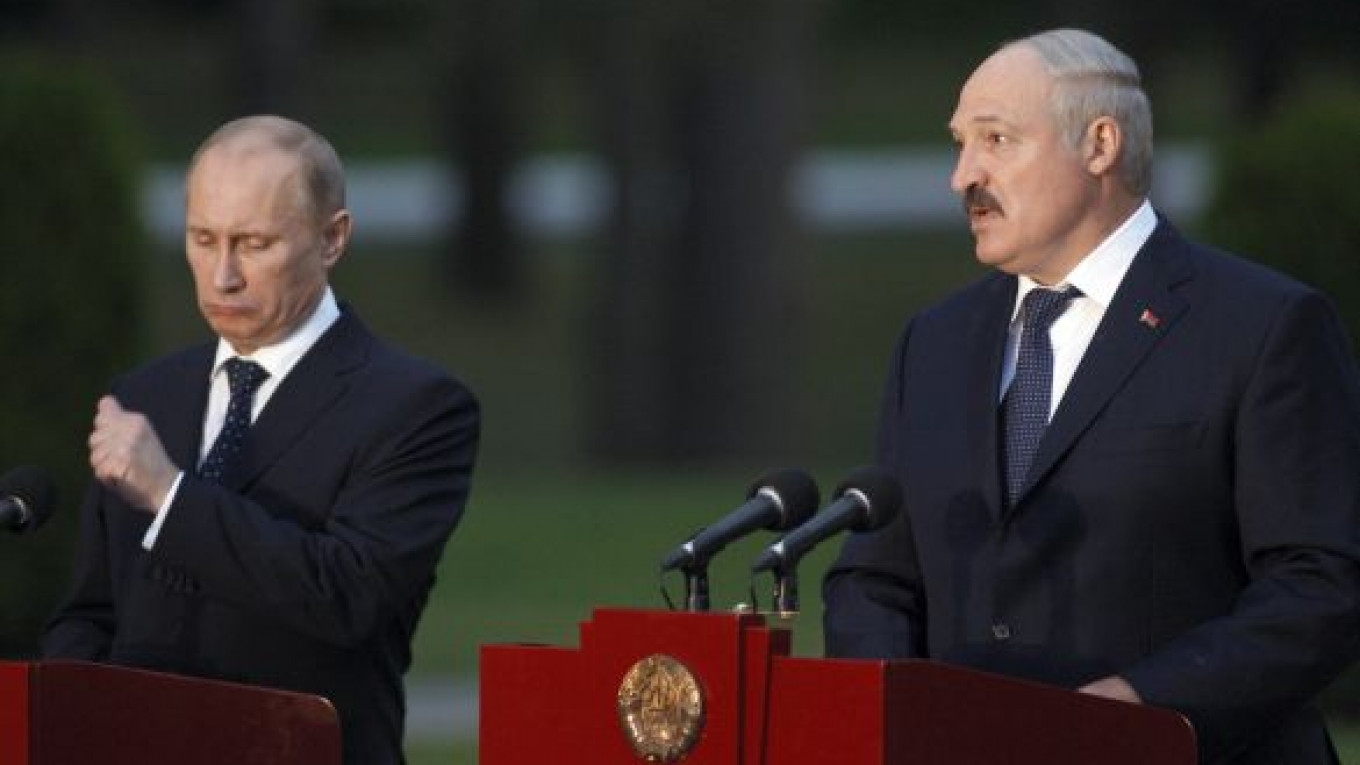In his first trip abroad since reclaiming the presidency, Vladimir Putin promised to extend more credit to Belarus as both countries agreed to accelerate joint economic projects including the construction of a nuclear power plant.
Putin chose Belarus, which has grown increasingly isolated under the authoritarian rule of President Alexander Lukashenko, as his first stop on a weekend tour of foreign countries to show that economic integration with Russia’s neighbor is still a priority, experts said.
“We had a very businesslike, concrete and focused meeting,” Putin and Lukashenko said in a joint statement, according to the Kremlin’s official site.
Lukashenko compared the two countries’ economic cooperation to the European Union.
Putin said in Minsk that Belarus would receive an additional $440 million to help its state-dominated economy. That comes on top of the $1.24 billion that Belarus has already received from the Eurasian Economic Community, whose main donor is Russia.
Belarus is slated to get a total of $3 billion from the council by 2013 in return for agreeing to privatize state assets over three years. The assets are worth $7.5 billion.
Experts said relations between the two countries will likely be more business-
focused during Putin’s third term as president, as Lukashenko’s country is experiencing harsh economic difficulties that leave it with few options to maneuver.
“Putin is pushing for economic integration while demonstrating a rather cool relationship with Lukashenko, as he sees this situation from a pragmatic position,” Belarussian political figure and former opposition presidential candidate Yaroslav Romanchuk told The Moscow Times.
While Putin praised the Belarussian government’s efforts to normalize its economic situation, he indicated that it was done mainly with the help of Russia, which has funneled about $5 billion in economic assistance to Belarus.
Russia agreed to help Belarus build a nuclear power station, a project that Putin said might become the “biggest project” in the countries’ economic integration. But while construction of the plant might allow Belarus to sell off some of its energy abroad, the project will also make Belarus even more dependent on Russian energy.
Belarus remains a vital transit route for Russian gas. Russia forced its neighbor to sell a controlling stake in national operator Beltransgaz to Gazprom in 2011.
Both sides are also looking at the possibility of selling a stake in Belarussian potash producer Belaruskali to Switzerland, said Vladislav Baumgertner, director general of Uralkali, which owns 50 percent of the company.
Romanchuk said putting the company under Swiss jurisdiction might allow Russia to resolve possible conflicts with the Belarussian side under international law.
With relations between Belarus and Europe deeply strained because of Lukashenko’s repressive policies, Russia’s push toward economic integration might be the only option for Belarus.
“The Kremlin takes the particularities of certain political regimes with understanding,” Romanchuk said in an article published on the Naviny news website on the eve of Putin’s visit.
A Message from The Moscow Times:
Dear readers,
We are facing unprecedented challenges. Russia's Prosecutor General's Office has designated The Moscow Times as an "undesirable" organization, criminalizing our work and putting our staff at risk of prosecution. This follows our earlier unjust labeling as a "foreign agent."
These actions are direct attempts to silence independent journalism in Russia. The authorities claim our work "discredits the decisions of the Russian leadership." We see things differently: we strive to provide accurate, unbiased reporting on Russia.
We, the journalists of The Moscow Times, refuse to be silenced. But to continue our work, we need your help.
Your support, no matter how small, makes a world of difference. If you can, please support us monthly starting from just $2. It's quick to set up, and every contribution makes a significant impact.
By supporting The Moscow Times, you're defending open, independent journalism in the face of repression. Thank you for standing with us.
Remind me later.






